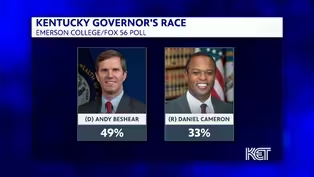
Federal Child Care Dollars Set To Expire
Clip: Season 2 Episode 92 | 4m 4sVideo has Closed Captions
Funding that provided hundreds of millions of dollars for Kentucky child care centers runs
Funding that provided hundreds of millions of dollars for Kentucky child care centers runs out.
Problems playing video? | Closed Captioning Feedback
Problems playing video? | Closed Captioning Feedback
Kentucky Edition is a local public television program presented by KET

Federal Child Care Dollars Set To Expire
Clip: Season 2 Episode 92 | 4m 4sVideo has Closed Captions
Funding that provided hundreds of millions of dollars for Kentucky child care centers runs out.
Problems playing video? | Closed Captioning Feedback
How to Watch Kentucky Edition
Kentucky Edition is available to stream on pbs.org and the free PBS App, available on iPhone, Apple TV, Android TV, Android smartphones, Amazon Fire TV, Amazon Fire Tablet, Roku, Samsung Smart TV, and Vizio.
Providing Support for PBS.org
Learn Moreabout PBS online sponsorshipKentucky Child Care Center has received hundreds of millions of dollars to keep their doors open during the pandemic.
Now, those quarterly payments have run out.
How might that affect child care, access and costs for Kentucky's working families?
Kentucky Auditions.
June Leffler has more.
Thanks, Renee.
I'm joined now by Charles All.
He is executive director of the Kentucky Chamber Center for Policy and Research.
According to the left of center think tank the Century Foundation.
More than 500 child care centers in Kentucky could close once this funding dries up.
How might that impact Kentucky's labor force?
That would have a significant impact on Kentucky's labor force.
You know, a lot of parents with young children are able to participate in the labor force specifically because they have access to child care.
The thing to keep in mind, you know, it's not entirely clear how a lot of these providers are going to react to drops in funding.
It is entirely possible that we will see some child care centers in Kentucky close.
I think that's that's probably likely.
As far as this plays out.
But you'll also see quite a few of them be forced to raise rates because the way that a lot of providers have utilized some of the funds that they've received through programs like the American Rescue Plan Act as well as other other legislative programs, is they've used it to do things like increase wages or to improve health and safety or to improve the quality of services that they provide.
The obviously going to want to maintain those things from a staffing perspective.
They're also going to have to maintain those things because if they reduce compensation, they're going to risk losing those staff members.
So what that means is, as we're anticipating some providers to have to increase costs.
Two thirds of Kentucky counties are considered to be child care deserts, according to the state cabinet for Health and Family Services.
How could the end of this funding further impact rural child care access in our rural economies?
It's a major problem in those areas.
A lot of folks that live in rural areas are put into situations where they're seeking out more informal arrangements for child care, or so the child might be moving from different locations depending on the day, depending on who's available to it to be there with them while the parents at work.
But a lot of those families are also having to travel significant distances in order to find childcare.
And so they might commute, you know, 30 or 45 minutes or an hour to child care and then they might have another commute to their actual workplace.
And you could imagine the strain that puts on an individual and the disincentive that I could also place on an individual to to participate in the labor force.
In addition, our Cabinet for Health and Family Services, they've they've used a lot of federal funding that we've received to encourage more, more and more providers to open up and offer services in rural areas.
They've also encouraged more in-home type providers, which can be really useful in rural areas.
And so those dollars, those are eventually going to run out as well.
And so it will be arguably more difficult.
Kentucky's Employee Child Care Assistance Program matches the child care costs an employer pays.
However, in August, WDR reported that only 17 employers have signed up for the program, and the parents of just 88 children have benefited.
Why is that?
Yeah, it's a brand new program, so it's been in existence since July.
And so I think people need to have appropriate expectations for how quickly employers are going to adopt a brand new program and integrate that into their employee benefit packages.
I think that's something that will happen over time.
So what we need is we need this program to stay out there longer and we also need to do more to raise awareness of this new program.
Gov. Beshear Campaigns In Owensboro
Video has Closed Captions
Clip: S2 Ep92 | 3m 27s | Hadley Duvall, an advocate for abortion exceptions, campaigns with Gov. Andy Beshear. (3m 27s)
Inside Kentucky Politics (10/6/23)
Video has Closed Captions
Clip: S2 Ep92 | 6m 26s | The latest political developments in KY, including a new poll in the governor's race. (6m 26s)
Poll Shows Double Digit Lead For Beshear
Video has Closed Captions
Clip: S2 Ep92 | 47s | A new poll from Emerson College and Fox 56 in the Kentucky governor's race. (47s)
Video has Closed Captions
Clip: S2 Ep92 | 3m 58s | Dr. Ilhem Messaoudi Powers from U.K. joins Reness Shaw to discuss RSV vaccines. (3m 58s)
Providing Support for PBS.org
Learn Moreabout PBS online sponsorship
- News and Public Affairs

Top journalists deliver compelling original analysis of the hour's headlines.

- News and Public Affairs

FRONTLINE is investigative journalism that questions, explains and changes our world.












Support for PBS provided by:
Kentucky Edition is a local public television program presented by KET



